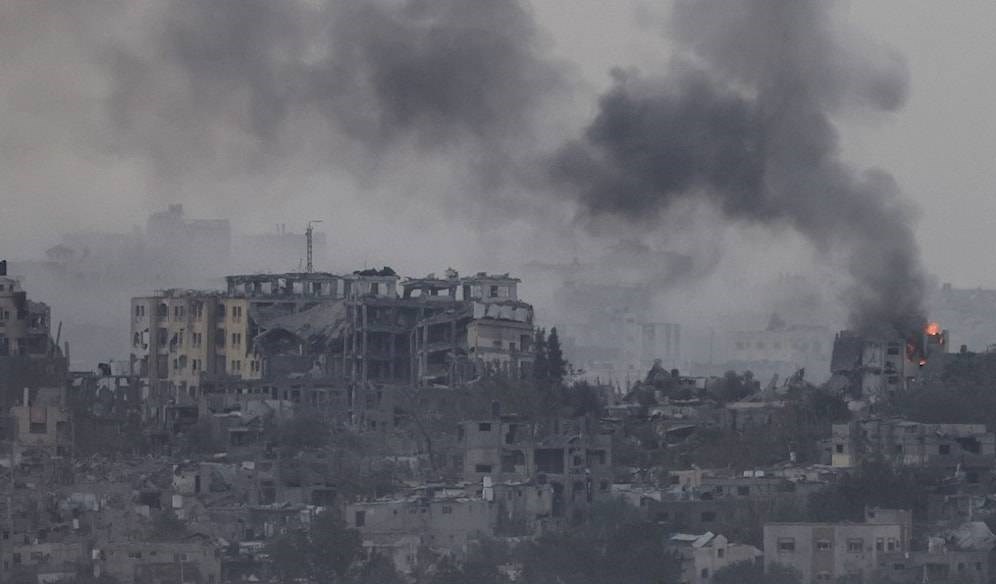With over 30,000 Palestinians killed since the beginning of the war, the city of Rafah, situated at the southern tip of the Gaza Strip, has become a focal point in the ongoing conflict between Israel and Hamas. Recent military operations by Israel have significantly escalated tensions, leading to widespread evacuations and a tragic increase in civilian casualties. Israeli airstrikes, aimed at Hamas targets within Rafah, have not only caused considerable damage to infrastructure but have also led to the loss of innocent lives, including a reported 22 people killed in a single day, 18 of whom were children. This stark increase in civilian deaths has cast a spotlight on the dire humanitarian situation unfolding in the region.
Amidst these escalating hostilities, the international community has been alarmingly reminded of the conflict’s severity through the experiences of a United Nations team. While attempting to carry out their duties, this team was compelled to take cover in a bunker to avoid the airstrikes, illustrating the perilous conditions faced by both residents and international aid workers in Rafah. Concurrently, discussions within the Israeli Prime Minister’s war cabinet have focused on strategies for a comprehensive military operation against Hamas in Rafah. These discussions indicate a potential intensification of military efforts aimed at eradicating Hamas’ influence in the area, signaling a worrying prospect of further civilian harm and displacement. The combination of increased military operations, civilian casualties, and the international community’s response underscores the urgent need for a de-escalation of conflict in Rafah to prevent further loss of life and suffering.
 Historical Context of the Israel-Gaza Conflict
Historical Context of the Israel-Gaza Conflict
The Israel-Gaza conflict, with Rafah as a critical juncture, has a long and complex history, punctuated by cycles of conflict, ceasefires, and negotiations that have failed to yield a lasting peace. The Gaza Strip, including Rafah, has been under blockade for years, contributing to a deteriorating economic situation and escalating humanitarian crises. This blockade has severely restricted the flow of goods and people, leading to widespread poverty and unemployment. The situation has reached a critical point, with food insecurity becoming increasingly dire. Predictions have surfaced, indicating that, by mid-July, half of Gaza’s population might face famine conditions due to the cumulative effects of the blockade and intensified conflict activities. This food insecurity is not just a statistic but a daily reality for thousands of families struggling to find their next meal.
Amidst this backdrop of hardship, the toll of the conflict on civilians has been particularly brutal, with recent reports highlighting the recovery of nearly 400 bodies from mass graves across Gaza. These findings underscore the devastating impact of military operations on the civilian population, many of whom have no involvement in the hostilities. The discovery of mass graves is a stark illustration of the conflict’s severity, bringing to light the urgent need for a ceasefire and a focus on humanitarian relief. The situation in Rafah and Gaza at large is a reflection of the broader historical and ongoing struggle that has led to significant loss of life and suffering for countless individuals caught in the crossfire of a seemingly intractable conflict.
Recent Events in Rafah
The escalation of military operations in Rafah has led to devastating impacts on civilian life and infrastructure, raising significant international concerns. Among the most alarming developments has been the damage inflicted on healthcare facilities, including a Gaza hospital, which has prompted calls for investigations into potential war crimes. This incident underscores the broader humanitarian crisis unleashed by the conflict, highlighting the dire consequences of military engagements in densely populated areas.
Furthermore, the conflict has severely disrupted essential services, with the cutting off of internet services in central and southern Gaza representing a critical blow to communication and the coordination of aid. This digital blackout has not only isolated the population at a time of extreme vulnerability but also hampered efforts to mobilize international support and resources. The resulting chaos from these military operations has forced a mass exodus, with tens of thousands of residents fleeing their homes. Those displaced face grim conditions, seeking refuge in areas ill-equipped to provide shelter or meet the basic needs of the growing number of evacuees. This displacement crisis adds another layer to the already complex humanitarian emergency, emphasizing the urgent need for a ceasefire and international intervention to prevent further deterioration of the situation in Rafah.
International Responses and Diplomatic Efforts
The international response to the escalating situation in Rafah has been multifaceted, with various nations and organizations expressing deep concern over the humanitarian impact and the potential for further escalation. Notably, the United States has taken a firm stance against a large-scale ground operation in Rafah, emphasizing the need for Israel to explore alternative methods to combat Hamas that would minimize civilian casualties and infrastructure damage. This opposition by the U.S. underscores a broader international plea for restraint and a focus on diplomatic solutions over military action. Despite this, the urgency of the situation has been amplified by a significant increase in the death toll, highlighting the relentless nature of the conflict and the immediate need for effective diplomatic intervention.
Efforts to broker a ceasefire have intensified, with diplomatic channels being pursued by various stakeholders to bring about a sustainable truce. The involvement of the Palestinian President seeking U.S. assistance to prevent an invasion of Rafah represents a critical plea for international intervention aimed at de-escalating tensions. This diplomatic push is part of a larger effort to address the ongoing violence that has not only devastated Rafah but also threatens to destabilize the region further. The hope is that through increased diplomatic pressure, a ceasefire can be achieved, preventing further loss of life and beginning the process of addressing the underlying issues that have fueled this conflict for so long.

Humanitarian Concerns and Efforts
The humanitarian situation in Gaza, especially in Rafah, has reached a critical point, drawing urgent attention from international organizations and advocates. The Norwegian Refugee Council, a key player in addressing the humanitarian needs in conflict zones, has explicitly warned against the severe consequences of Israeli military operations in Rafah. These operations not only threaten the lives of civilians but also jeopardize the delivery and effectiveness of humanitarian aid in the area. This concern is exacerbated by the staggering number of housing units affected—69,000 have been destroyed, and an additional 290,000 homes have suffered damage. This widespread destruction has not only displaced thousands of Palestinians but has also significantly hindered their access to essential services and shelter, compounding the humanitarian crisis.
In response to the escalating violence and its impact on civilians, humanitarian organizations are tirelessly working to provide relief and support to those affected. The destruction of housing and infrastructure has led to an urgent need for shelter, medical care, and food assistance among the displaced populations. However, the efforts of these organizations are often hampered by the ongoing conflict, making it challenging to reach those in dire need. The situation in Rafah illustrates the broader humanitarian crisis in Gaza, where the civilian population bears the brunt of the conflict. The call for an immediate ceasefire by humanitarian groups reflects the critical necessity to halt the violence, allowing for the provision of essential aid and the beginning of recovery efforts for the war-torn communities.
Potential Impact of Israel’s Push into Rafah
The escalation of military actions by Israel in Rafah has triggered a wave of concern from various humanitarian organizations, fearful that a ground offensive could severely disrupt the flow of essential aid to the region. Such an operation not only threatens to exacerbate the already dire humanitarian conditions, including widespread hunger and disease but also poses a significant risk to civilian lives. The Norwegian Refugee Council, notably, has warned of the potential for increased civilian casualties and the detrimental impact on Gaza’s aid system, emphasizing the critical need for a ceasefire to prevent further loss of life and to ensure the continuation of humanitarian assistance [4].
Moreover, the situation has been compounded by the difficulty in establishing safe evacuation routes for the population, especially for the most vulnerable groups like children. The absence of secure pathways for fleeing civilians highlights the grave risks associated with military incursions into densely populated areas. This concern is not unfounded, considering the recent intensification of airstrikes in Rafah, which has led to significant civilian evacuations and casualties, underscoring the urgent need for international intervention to mitigate the humanitarian crisis and protect innocent lives [3]. The stark warnings issued by organizations like the Norwegian Refugee Council underscore the critical importance of prioritizing civilian safety and aid delivery, urging immediate action to prevent a further escalation of the crisis.
 Urgency for International Intervention and Sustainable Solutions
Urgency for International Intervention and Sustainable Solutions
The escalating conflict in Rafah has reached a critical juncture, necessitating urgent international intervention to prevent further deterioration of the humanitarian situation in Gaza. With Israel’s potential invasion of Rafah on the table, there is a heightened risk of a “bloodbath” for civilians, underscoring the imperative for a swift and coordinated global response to forestall a catastrophic deepening of the crisis. The international community’s focus is sharply on crafting a sustainable solution that addresses the immediate threats and lays the groundwork for lasting peace in the region. The urgency of this situation is compounded by the dire humanitarian conditions in Gaza, where food insecurity and displacement are rampant, making the need for a ceasefire and the resumption of aid deliveries more critical than ever.
The call by the U.N. Secretary-General for an immediate humanitarian ceasefire and a significant increase in aid delivery to the region underscores the critical role of international cooperation in addressing the crisis. This plea highlights the global recognition of the gravity of the situation and the necessity for all parties involved to prioritize the well-being of civilians and work towards de-escalating the conflict. The ongoing diplomatic efforts, including discussions for a “sustainable” truce, reflect a concerted effort to leverage international influence to bring about a resolution. However, achieving a sustainable solution requires immediate actions to halt the hostilities and a long-term commitment from the international community to address the underlying issues fueling the conflict, ensuring that future generations can live in peace.



No responses yet